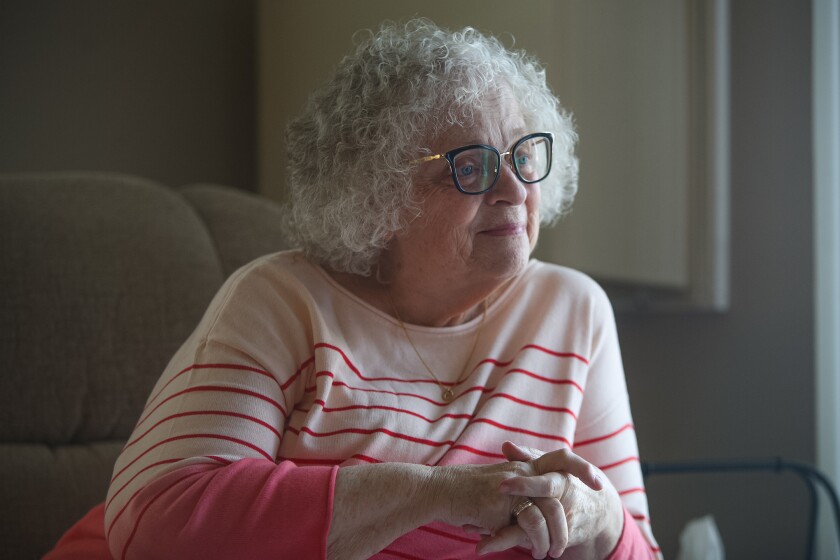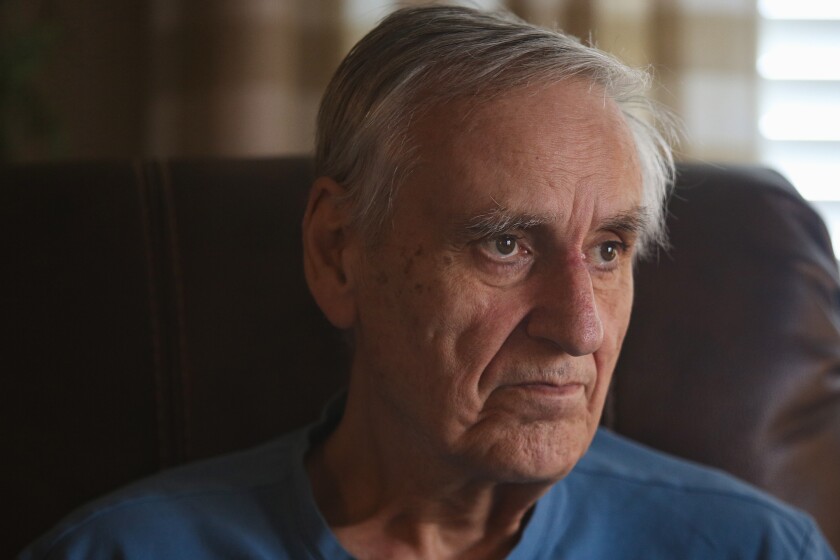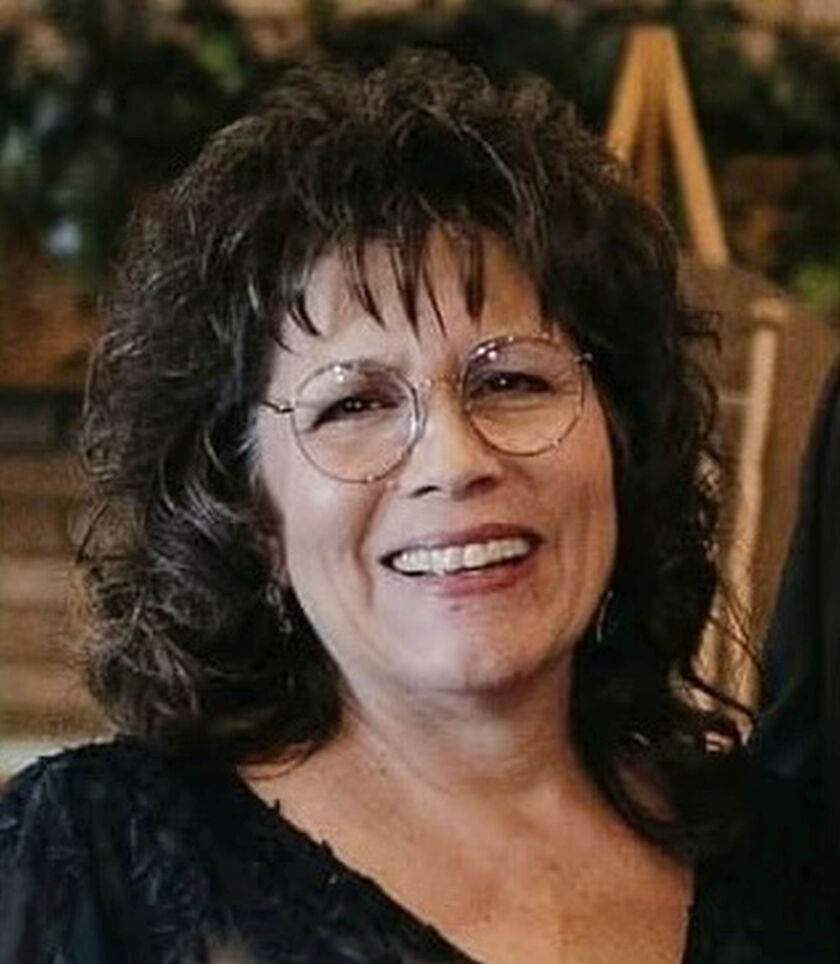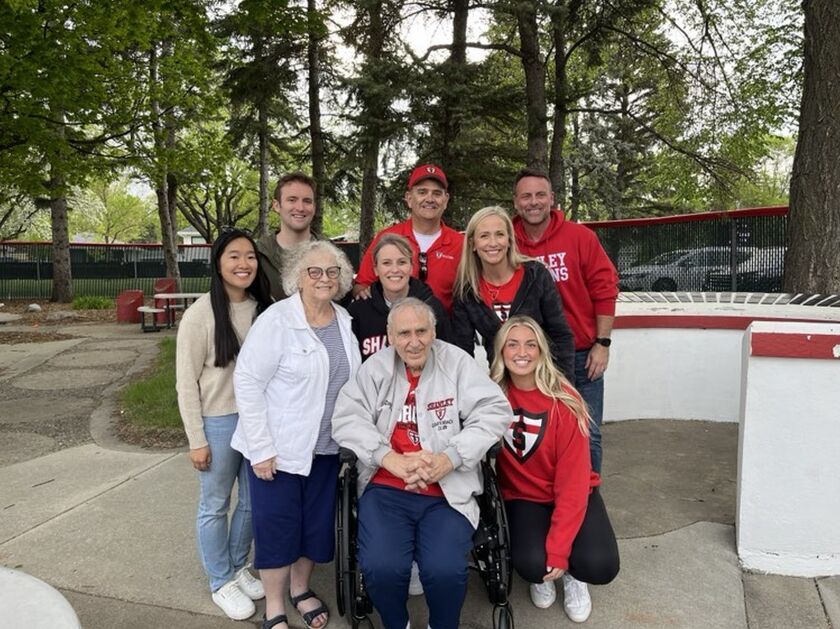FARGO — Growing up in Zeeland, North Dakota, in a family of 15, Ray Meier became accustomed to a growling stomach.
“Many times we had little food,” he says, noting that flour was often the only store ingredient they could buy. “We’d have milk soup. We’d milk the cows and boil the milk, then put in some of the noodles we’d made. And that was it!”
His parents, Germans from Russia, were English illiterate, but fully literate in the love of God, according to Ray. Daily, they meditated on Jesus’ life by praying the Rosary.
That faith, which included a steadfast trust in God’s provisions, has marked Ray’s life in an indelible way, including recently upon hearing: “You have ALS.”
The diagnosis comes with an assurance of suffering. But Ray refuses to let it haunt him. Even knowing a feeding tube would be forthcoming as his ability to eat and do other everyday tasks continues to wane, he shrugs, “I’ll get a lot of praying in!”
His wife, Pat, who’s had her own health trials, says she initially resisted believing her husband of 54 years would be given such a devastating diagnosis, hoping it was instead myasthenia gravis, which, while still difficult, isn’t always fatal.

But self-pity soon gave rise to hope for both; not in a cure or reversal, but in living life to the full as the gift it is.
“In the morning when the sun is out, I say, ‘Thank you, God, for the sun!’” Ray says. “And when we’re down at the lake — it could be my last year down there — we’re going to enjoy it the best we can.”
Threat of MAID
Their strong faith has prompted the couple to reflect on their neighboring state of Minnesota, where Medical Aid in Dying (MAID) legislation , allowing for assisted suicide, is building momentum.
Despite his harsh prognosis, Ray, who worked for several decades caring for patients as a certified anesthetist specialist in pediatric oncology, vehemently takes issue with the trend.

“If they said to me, ‘Can we just give you an overdose of morphine,’ I’d say, ‘For what?’” he says. “I don’t think God would like that. I pray to him every morning to assist me with everything I do.”
Ending his life on his terms, he says, would be an offense to God. “The Lord is going to walk with us. Every breath we take, the Lord is with us.”
It’s the same conviction he has about abortion, he says, noting that both life’s beginning and end should be in God’s realm.
Pat agrees. “I sort of feel like, if God gave me these physical demands on my body and trusted me to do his will with grace — at least as much as I can manage — why wouldn’t I be joyful?”
“We need to look at God’s perspective, not ours,” Ray responds.
“There’s a joy in just being,” Pat says, “regardless of what that being is like.”
Assisting the dying
Martha Burns, a registered nurse, helps educate others in her field on bedside care, including in the dying process. Her interest in this area sprang from the many deaths she experienced in her own life, beginning with her father dying when she was only nine.

Death continued to be a part of her living experience, including losing her mother 26 years ago, and a tragic car accident in 2012 that claimed the lives of four family members: two nieces and their two pre-born children.
This frequent facing of death has caused her and her nine siblings to be rather casual about the topic. “We have dark humor in our family about it because we’ve experienced so many kinds of death,” Burns says, noting that each kind, whether traumatic or progressing with a disease, brings a different perspective.
It has also caused conviction within Burns that there’s no need to hasten the end of life through government intervention. “I know some people haven’t died with great peace and comfort, and that’s what leads us to the whole ethical issue of MAID, but I believe with the proper care, people don’t have to suffer.”
Though the isolated area of Montana in which she grew up did not offer great hospice care for her ailing mother, and some symptoms were distressing, nevertheless, “we had so many beautiful moments where she interacted with my siblings and me and said some very profound things.”
That they were all able to be with her and do their best to love her through her discomfort, she says, continues to be a gift all these years later.
Shouldn’t God decide?
Kris Hintz, a former parish nurse at Saints Anne & Joachim Church, has been bringing the Eucharist to the Meiers since they can no longer make it to Mass due to Ray’s symptoms and Pat’s limitations.

Visiting with them regularly since April, Hintz has been touched by their resilient attitudes. “Ray is such a gentle soul and appreciates life to the fullest even when he’s suffering.”
Hintz had been reading about Minnesota possibly joining the growing number of states to join the MAID movement and noticed how many people seem swayed.
“I get worked up, because there’s rarely somebody talking about the other side,” she says. “Where’s the value in life, the concept that God is our creator and God is the one who decides when we pass?”
She continues, “(ALS) is such a horrific disease, and yet from (Ray’s) outlook you would never know it. And I just think people need to know those stories, too.”
Earth isn’t heaven, she says. “Everyone’s at a different place. Some people are celebrating a new baby, a new job. There are some who are rejoicing and others who are mourning.” Heaven is what awaits us, she adds, “And I think that part gets forgotten, and we jump to, ‘I’m suffering; let’s end this.’”
Role models in suffering
Hintz says the fact that the Meiers are both medical professionals—Pat worked for many years as a nurse—only heightens the intensity, because “they’re well aware of what’s coming down the pike,” and yet in her visits, she’s found calm. “They’re such role models in how to handle suffering, and to realize the good that can come out of it.”
Ray can no longer hold his own toothbrush easily. He’s lost 65 pounds in the last months. A shortness of breath follows him daily. But instead of woe, he focuses on the blessings, like how his time in the military has provided for his needs.
According to Pat, 60 percent of those affected by ALS are veterans, so it’s considered a 100-percent service-connected disability. “They don’t know why, but because it’s such an overwhelming percentage…all of his medical equipment, hospital bed, medicines, power wheelchair, all of that is paid for.”
Included is a van to transport the wheelchair and ramps being built at their lake home; a cherished gathering place for their beloved family.
After Ray’s diagnosis, their oldest grandson, Alex, started sending his grandfather a “Monday memory” through text, Pat says, and recently, it included a childhood recollection of Ray making him egg salad on crackers during his visits.
Alex’s youngest brother, Ryan, pops over regularly to chat with his grandparents, help around the house, and play videogames, Pat says, while their mother, Kari Sornsin, has promised to keep the lawn at the lake mowed. Neighbors and many friends have been unbelievably kind and helpful.
On May 14, Ray had the privilege of tossing out the first pitch of the season at a Shanley High School baseball game, and in the fall, the two will be honored by the school with the prestigious Deacon Award.

Life is as full as it can be, they say, and they will keep moving in that direction, with prayer framing their days. “Ray’s faith life towers in comparison to mine,” Pat says, “because, oh my goodness, he visits with the Lord all day long!”
Perhaps it’s reflective of that childhood in rural North Dakota when, despite tight resources, the love of family flowed in abundance, and Ray stood surrounded by those who, like his loved ones now, believe that by trusting in the mercy of God—even in suffering—all will be well in the end.
[For the sake of having a repository for my newspaper columns and articles, I reprint them here, with permission, a week after their run date. The preceding ran in The Forum newspaper on May 26, 2024.]

Leave a Reply